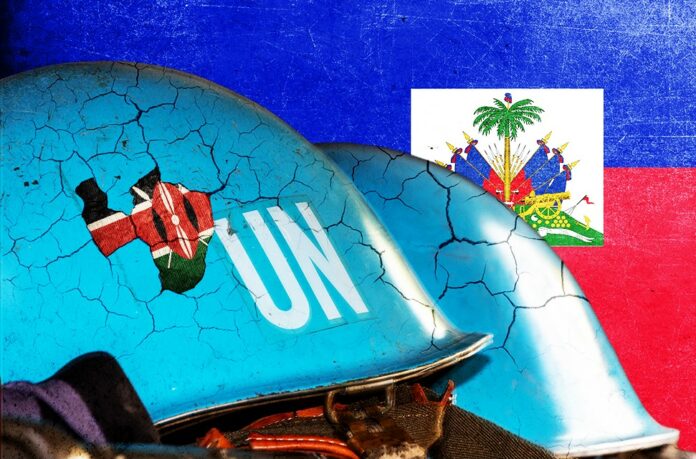There are issues surrounding the possible deployment of a multinational force to accompany the national police in their quest to rein in the marauding gangs, troubling residents for several months. A year ago, interim PM Ariel Henry went before the world body to plead for an intervention force. A year later, the Kenyan government committed a thousand member forces to help the PNH in their crime-fighting venture. However, a Kenyan court halted the planned intervention by placing a temporary injunction against the deployment of troops to Haiti, at least until October 24, 2023, following a lawsuit brought by the opposition Thirdway Alliance party. The opposition party contends that the Ruto government violates the 2010 constitution, which does not warrant the police to undertake missions outside the country. According to the constitution, only the Kenya Defense Forces can be deployed outside the country, and the police can only operate inside the country. With this, they state that the government has violated the constitution. Furthermore, petitioners argue that there was no cabinet meeting nor any cabinet memo/resolution to prove that due process had been followed. There may be doubts as to whether Haitian law authorizes the deployment of the Kenyan police in their country, and there is a real risk that the deployment will take place without respecting the Haitian constitution itself. The order by Judge Chacha Mwita, comes after the petitioners sued Kenyan President William Ruto, Cabinet Secretary for Interior and National Government Administration Professor Kithure Kindiki, Police Inspector Japhet Koome, President of the National Assembly Justin Muturi, and the National Security Council.
Dominican authorities announced the partial reopening of their border with Haiti to facilitate commercial activities between the two countries. The policy in place, starting on Wednesday, October 11, 2023, will establish a temporary commercial corridor to facilitate trade in essential Dominican products, such as food and medicine, especially for infants. The decision was made during a cabinet meeting on October 9, 2023, which specified that the passage of persons would not be accepted, and the government would establish a biometric register at the border and create a fund for the mechanization of agricultural work. Through the Development and Export Bank, la Banque de développement et d’exportation (Bandex), the National Security Council intends to activate the fund, which will finance a vast agricultural mechanization program to reduce the dependence on hiring undocumented migrant workers who are predominantly Haitian. The policy went on to state that the Dominican Republic would strengthen the militarization of the border to make it more difficult for gang members fleeing the multinational force to enter Dominican territory while maintaining the migratory closure of the border and the suspension of visa issuance to Haitian nationals indefinitely. They’re also planning on banning the export of electronic products, cement, rods, and other construction materials to prevent the construction of structures that could be dangerous to the environment.
In response to these measures, the Northeast chamber of commerce, La Chambre de Commerce, d’industrie et des professions du Nord-Est d’Haïti (CCI/Nord-Est), expressed their disappointment after these measures were made public by the Dominican Authorities. According to the head of this body, Albert Pierre-Paul Joseph, the Dominican Republic does not see Haiti as a trade partner. He is trying to demean the country with a President whose attitude resembles a hegemonic leader’s, thinking that the entire island belongs to him. Mr. Paul Joseph believes that the Dominican leadership is taking advantage of the crisis in Haiti, where we are witnessing a total state collapse. He wonders if the Haitian authorities are not in cahoots with the DR since there’s not been a corresponding proportional response from the Ariel Henry government.
The Henry administration, on the other hand, issued a press release yesterday in which it congratulated the Haitian public for their calm, serenity, and patriotism in the face of the disproportionate measures taken by the Dominican authorities while reaffirming Haitians’ inalienable right to use the binational water resources equitably. Though the canal on the Massacre River was the source of the Dominican protests and subsequent unilateral closure of the border, the Prime Minister’s office favored dialogue and wished for a suitable outcome that would allow for the equitable sharing of the water resources, the normalization of relations between the two countries and the movement of people and goods on both sides. The CCI/Nord-Est argues that his position is outdated since the Dominicans are not changing their minds on their objection to the canal construction. The Haitian government also failed to consult the local chambers of commerce to see how the border closures affect them.
Finally, the Minister of Economics, Michel Patrick Boisvert, installed a new board of directors on Monday. The board will oversee the bank’s activities for the next three (3) years. The Minister stated that he is counting on the leadership of the new governor so that the BRH can continue to play its essential role in achieving macroeconomic stability and promoting the government’s socio-economic policies. The new board comprises Ronald Gabriel, the new Governor; Georges Henry, Deputy Governor; Mathieu Fortunat, General Director; Me Michèle Delerme; and Mr. Florient Jean Mari, who are members. Speaking on behalf of his colleagues, the new governor, Dr Ronald Gabriel, expressed his vision of a stable financial future focused on controlling inflation, stabilizing the exchange rate, promoting growth and employment, strengthening human capital, and promoting scientific research. He promises that monetary policy will emphasize the search for better conditions for the effectiveness of the intervention tools of the Central Bank, namely, compulsory reserve rates, key rates, SWAP operations, and rectification interventions on the markets, particularly the foreign exchange market.
Dela Harlley

